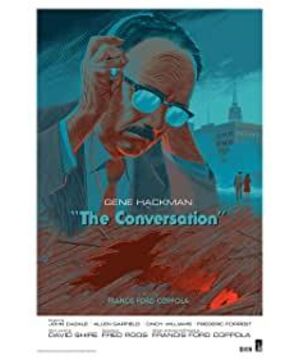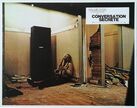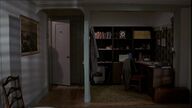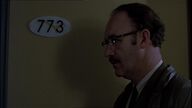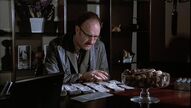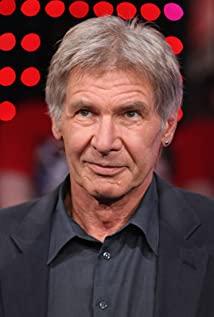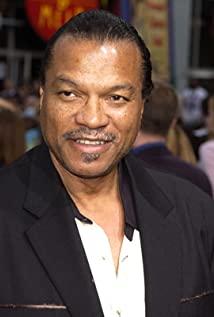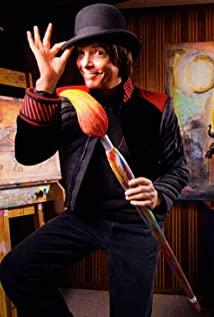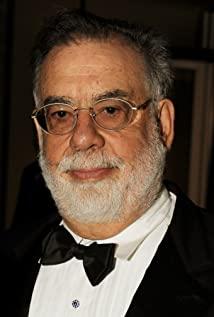http://qfmeng.blogbus.com/logs/195782396.html
The Conversation (1974)
Continue to watch the Palme d’Or award-winning films. The film won the Palme d'Or at the 27th Cannes Film Festival in 1974.
The film tells the story of a man who uses eavesdropping as his job. The actor specializes in eavesdropping. His most recent job was to hire the chairman of a large company to eavesdrop on a conversation between a man and a woman. The actor has been engaged in eavesdropping for many years and has a good reputation in the industry. However, after his eavesdropping work killed a family of three, the actor left New York and came to San Francisco. When the actor sorted out the tapes of the dialogue between the male and female and turned it over to the chairman, he found that the chairman himself did not accept it but his assistant. The protagonist immediately refused to hand over the tapes, and learned from the assistant that these tapes would kill people. In this way, the male protagonist began to be immersed in the past mistakes and the current predicament, even if the gathering with friends is not happy. The actor intends to destroy the tape, but the tape is stolen by a woman who stays overnight. When he returned home, the actor realized that he had been tapped by the chairman's assistant, and the tape was sent to him. After seeing the chairman got paid, the leading actor came to the place agreed by the man and woman on the tape. Afterwards, the actor saw the bloody murder scene, and he went into hiding in fright. A few hours later, the actor could not find any traces of spiders and horses on the scene, so he had to come to the chairman. However, the chairman has already died in a car accident, and the actor also sees the man and woman in the conversation. These let the male protagonist understand everything. In fact, the men and women in the dialogue are not the murderers, but the murderers. Dialogue men and women conspired to kill the chairman. When the actor returned home, the chairman's assistant called and told the actor that he had been tapped. When the actor found out, he frantically searched for a bug, and almost demolished the entire house but found nothing. The protagonist finally played the saxophone alone at home.
This movie is the work of the great director Francis Ford Coppola, but it is different from his other movies. This film is neither a gangster film nor a war film, nor does it have a Hollywood commercial film model. On the contrary, there are many dreams, hallucinations, and imagined images in the film, which are very abstract, making the film itself more like a European art film. Watching such a style of film, I also know why this film won the Palme d’Or. Because the film's non-commercial plot, abstract pictures, and the theme of the characters' hearts are very much in line with the taste of the Cannes Film Festival. This film can be described as "fitting it".
The theme of the film expresses two aspects. One is to show the phenomenon of "eavesdropping" in American society in the 1970s, reflecting social reality; the other is to show the living conditions of Americans in the 1970s, that is, through the inner struggle of the male protagonist, Torture of conscience and so on show the life of ordinary Americans, and tell the audience that evil is overwhelming and that human nature is still good after all. In the first aspect, the film is shown through the display of the wiretapping industry. For example, the crowded exchange meeting, the government's need for the eavesdropping industry, the men and women in the conversation to guard against strangers, and the most ironic-the male protagonist was tapped, and so on. The world in the film can be said to be a society that is eavesdropped everywhere, so it is not surprising that the Watergate incident occurred in the United States in the 1970s. Even ordinary people are tapped, let alone political parties? The second aspect is undoubtedly revealed in the actor's hesitation and dreamlike hallucinations. The protagonist is a kind person. He has been condemned by his conscience because of his faults, but his work requires ignorance of his conscience. How can he not suffer? And this task seems to make the old thing happen again, how can the actor not hesitate? From these we can see the living conditions of Americans in that era: Most people have traditional morals, but technological progress and violations have surpassed the limits of morals, so people are struggling. Is it to follow pious beliefs and obey ethical codes? Or follow the progress of technology and leave everything behind? This was a difficult choice faced by Americans in the 1970s. Therefore, in the 1970s, there were hippies, rock music, and various acts of subverting tradition in the United States. The above summed up in one sentence is that Americans in the 1970s lived in a society of great change, and everyone had to make choices. Of course, the final choice made by the actor tells the audience that people will still obey morals, and human nature is still kind.
The filming is the best editing. The movie plays through the recording of male and female dialogues, by switching different things, different spaces, and inserting different dialogues, showing the inner struggle and troubles of the male protagonist, which is perfect. In this regard, the film has sharp images and unique perspectives. Especially when the protagonist analyzes the contents of the tape, people can feel a gloomy fear, as if there is a big conspiracy. In addition, the scene where the actor witnesses the killing process is also very good, with a little taste of "Mentally Ill", but it also makes people feel a kind of real blood. Francis Ford Coppola is indeed an excellent director. He was underestimated before. As for other aspects, it is more ordinary. Many people think that the classic wall-breaking passage is not surprising to me. In short, the film has the characteristics of European movies, delicate, abstract, fuzzy, and attention to atmosphere, which is very different from Hollywood movies.
The actors are all old Hollywood actors. Gene Hackman, John Cazale, and Robert Duvall are all familiar acting schools. I won't say much about their acting skills, each of which has been taken in film history. What surprised me most about this film was that I saw the very young and fair Harrison Ford, who turned out to be making movies early. However, Harrison Ford's fame was lucky, and he was on the fast track to fame in the "Star Wars" and "Indiana Jones" series. In the film, Cindy Williams, who plays the role of the woman in the dialogue, is very beautiful. After checking the information, she found that she had starred in "American Style Painting". Hey, I have forgotten her. Others are supporting roles, not to mention.
in conclusion. This is an unconventional Francis Ford Coppola Hollywood movie, which is very different from his other movie styles. However, the film shows another aspect of American society, even though it is not a masterpiece, it can be considered a good movie. It's just that the movie is not so good, there are too many dialogues, it looks very laborious, and the plot is not very attractive.
Sequence: 0732
The.Conversation.1974.720p.BluRay.X264-AMIABLE
2012-03-02
View more about The Conversation reviews


